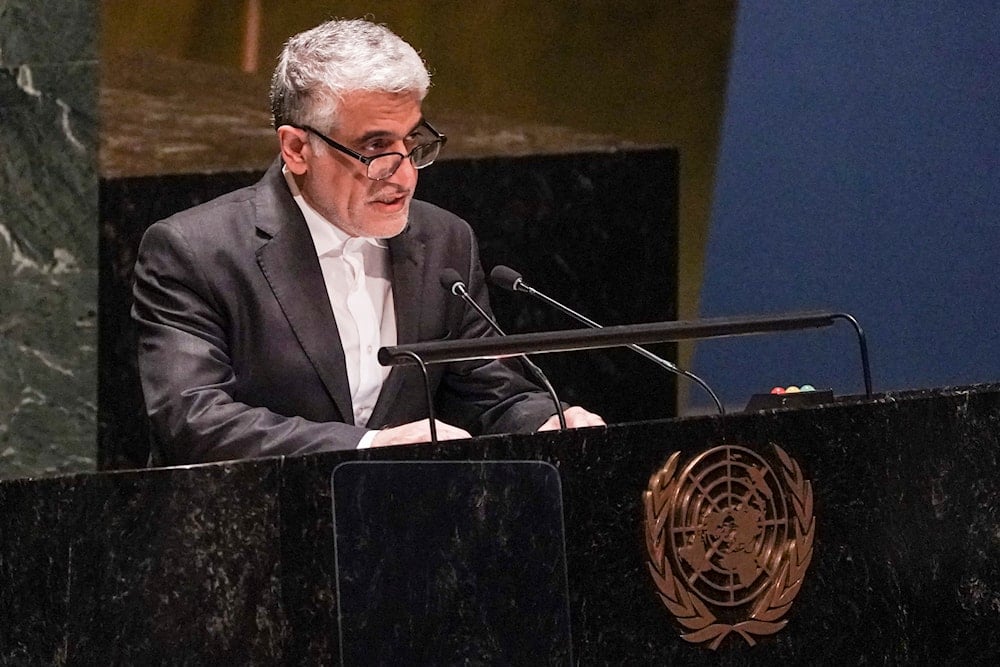US backing terrorist resurgence in Syria, Iranian Envoy asserts
Iran's ambassador to the UN, Saeed Iravani, highlights the catastrophic impact of the terrorist awakening in Syria, urging the international community to resolve the crisis.
-

Iran's United Nations Ambassador Amir Saeid Iravani addresses the UN General Assembly on Thursday, February 23, 2023, at the UN headquarters in New York, the United States. (AP)
Iran's ambassador to the United Nations, Saeed Iravani, accused the United States of fueling the resurgence of terrorism in Syria, affirming that Washington uses terrorism as a foreign policy instrument to further its political goals.
Speaking at a UN Security Council meeting on Tuesday that addressed recent developments and terrorist awakening in Syria, Iravani stated that external support and intervention, led by the US, have sustained terrorism in Syria, while also undermining the country's sovereignty and territorial integrity.
In its address to the UNSC president, Iran expressed grave concerns regarding the escalating situation in Syria, particularly the coordinated terrorist attacks by Hay’at Tahrir al-Sham (HTS), a group linked to Al-Qaeda, which has severely threatened Syria’s sovereignty and stability.
In one instance, terrorist attacks on Aleppo also compromised the premises of the Iranian consulate, which was consequently intentionally targeted by terrorists. Such attacks are considered a blatant breach of international law, Iravani stated, emphasizing that "No individual, group, or state has the right to commit or enable such acts."
Thereby, he further held the countries that arm and support these terrorist groups, enabling their continued aggression and disregard for international norms, accountable.
The impact on civilians
The ongoing crisis in Syria is largely driven by external support and intervention, which have exacerbated terrorism and undermined the country’s sovereignty, Iravani continued. The advanced capabilities of HTS, including weapons and drones, suggest deliberate external backing, with the United States playing a key role in using terrorism as a tool of foreign policy to advance its political goals.
Detailing the impact on Syrian civilians, the Iranian diplomat said the countries responsible for fueling the conflict must be held accountable for the harm inflicted on the Syrian people.
He also addressed the Idlib de-escalation zone agreements, stressing that the recent terrorist attacks also undermined the agreements under the Astana process, with participants in the 22nd Astana meeting expressing concern over the groups' activities.
Additionally, increased Israeli airstrikes on Syrian civilians and civilian infrastructure, combined with the Israeli regime's ties to HTS, suggest a coordinated effort to further destabilize and shake the region. "Israel’s" attacks on border crossings, particularly with Lebanon, have disrupted vital aid deliveries and caused widespread displacement, he underscored.
The role of the international community
Iravani further reiterated the detrimental impact of the terrorist resurgence in Syria, asserting that if not contained, the entire region could be uprooted by its results, namely insecurity, expansion of terrorism, and violent extremism.
"No distinction can or should be made between types of terrorism—there is no such thing as “good” terrorism and “bad” terrorism," he stressed, reasserting that HTS is specifically designated as a terrorist group by the Security Council. Should the international community fail to control and stop its activities in Syria, Iravani added, the domestic, regional, and international consequences would be disastrous.
Recapitulating his address, Iravani emphasized that all efforts to confront terrorism in Syria must be coordinated with the Syrian government, ensuring full respect for the country’s sovereignty and territorial integrity.
This includes ending foreign occupation and interference, halting the exploitation of Syria's resources, ending support for terrorist groups, and promoting dialogue among all relevant and involved parties. The international community must also focus on extending humanitarian aid, rebuilding infrastructure, and ensuring the safe return of the displaced.
The Syrian people deserve peace, dignity, and the opportunity to rebuild their nation free from terrorism and external interference, he concluded.
Iran ready to consider troops in Syria
Iran has recently expressed willingness to consider deploying troops to Syria if an official request is made by the Syrian government, Iran's Foreign Minister Abbas Araghchi said. He highlighted that the resurgence of terrorism in northwestern Syria, marked by surprise attacks from terrorist groups, poses greater security risks to "neighboring countries such as Turkiye and Iraq than to Iran."
In an interview with The New Arab, Araghchi voiced concern over the potential breakdown of the Astana process. Designed to facilitate dialogue and resolve the Syrian conflict, the process is now under scrutiny as terrorist violence escalates. Araghchi criticized Turkiye, a key backer of foreign-supported militancy in Syria, for failing to meet its commitments under the initiative.
Discussing Tehran’s ties with its allies in the Axis of Resistance, Araghchi clarified, "Iran does not command Resistance factions in Arab countries and does not have organizational ties with them; rather, it supports their cause and provides assistance when necessary."
An advisor to Iran's Leader Sayyed Ali Khamenei, Ali Akbar Velayati, confirmed on Tuesday that "the events in Syria are part of an exposed plan, a scheme designed to distort truth and propagate falsehood."
In a press statement, Velayati emphasized that "the United States, the Zionist entity, and all regional countries, whether Arab or non-Arab, must realize that Iran will steadfastly support the Syrian state until the end."

 5 Min Read
5 Min Read








